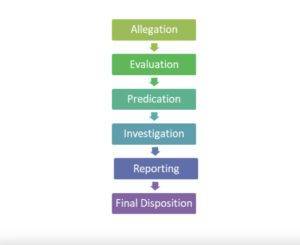Final Investigative Process
The investigative approach can vary between professionals but in general refers to the systematic method or strategy used to gather information, evidence, and insights to uncover facts, solve problems, or make informed decisions. It includes a series of steps designed to methodically explore and analyze a situation or issue. Here’s a general, six step process outline of an investigative approach noting that certain elements of the first three stages can overlap:

Allegation
The investigative process immediately begins with the receipt of an allegation or complaint regarding potential misconduct, violation of policy, or other concerns. The allegation should be well documented and reviewed to determine its credibility and seriousness.
Evaluation
Evaluate the allegation to determine if it warrants further investigation; one must consider factors such as the reliability of the source, the feasibility of the alleged act to have taken place, the nature of the allegation, and the potential impact on the organization. From here the party must decide whether to proceed with an investigation based on the evaluation. If the evaluation leads the company to decline a formal investigation, the reasoning and factors determining this decision should be documented.
Predication
Prior to continuing, you must establish predication, which means determining whether there is a reasonable basis to believe that misconduct or wrongdoing may have occurred. For example, did the individual(s) allegedly involved have the access to commit the misdeed?
Predication involves gathering enough information to justify initiating a formal investigation. To do so, assess the available evidence and information to determine if there is sufficient cause to proceed with an investigation.
Investigation
If predication is established, conduct a thorough investigation into the allegation. Start by developing an investigation plan outlining the scope, objectives, and methodology of the investigation. You will also want to form an investigative team depending on the expertise needed to successfully execute the investigation. Also, determine if the investigation should be placed under attorney client privilege. Next, gather evidence through interviews, document reviews, data analysis, surveillance, and other investigative techniques. Maintaining the integrity of the investigation is paramount. Do so by adhering to legal, ethical, and procedural standards. Ensure that detailed records of all investigative activities and findings are documented and secured.
Reporting
Prepare a comprehensive report clearly documenting the investigation process and steps taken, evidence and findings, and fact-based conclusions. Never add opinion of guilt, speculation, or rumor into an investigative report. Be sure to include a summary of the allegation, the investigative steps taken, the evidence collected, and any relevant analysis. The report must be free of any grammatical and/or mathematical errors. It must also be clear, objective, factual, and well-documented to facilitate decision-making and follow-up actions.
Final Disposition
Based on the findings of the investigation, make a determination regarding the disposition of the case. Determine whether the allegations were substantiated or unsubstantiated. If misconduct is found, consider appropriate disciplinary actions or remedial measures. Ensure that any corrective actions taken are proportionate, consistent, and in accordance with organizational policies and procedures.
This investigative process provides a structured framework for handling allegations, conducting thorough investigations, and reaching informed conclusions. It emphasizes the importance of maintaining objectivity, integrity, and accountability throughout the investigative process.
Remember, most investigations should be left up to experienced professionals. Hiring a professional to conduct your internal investigations provides peace of mind to organizations and individuals facing complex or sensitive issues. Professional investigators with years of experience are valuable to an organization that is facing uncertainty. In fact, engaging an outside entity to perform internal investigations can dispel allegations of prejudice or bias, and add credibility to the outcome. External investigators may conduct investigations more frequently than internal resources and, because of their experience, limit the allegations of a flawed investigation and related liability.
If you find yourself in need of an internal corporate investigation, contact the experts at North American Forensic Accounting today to set up a consultation.

